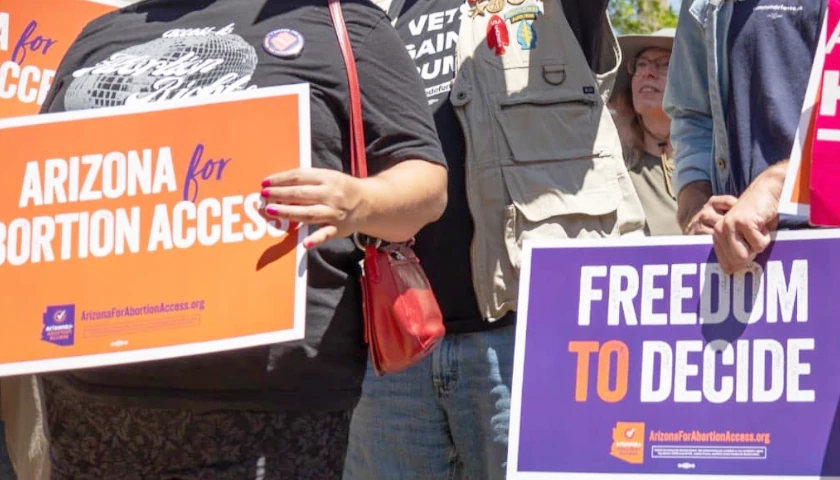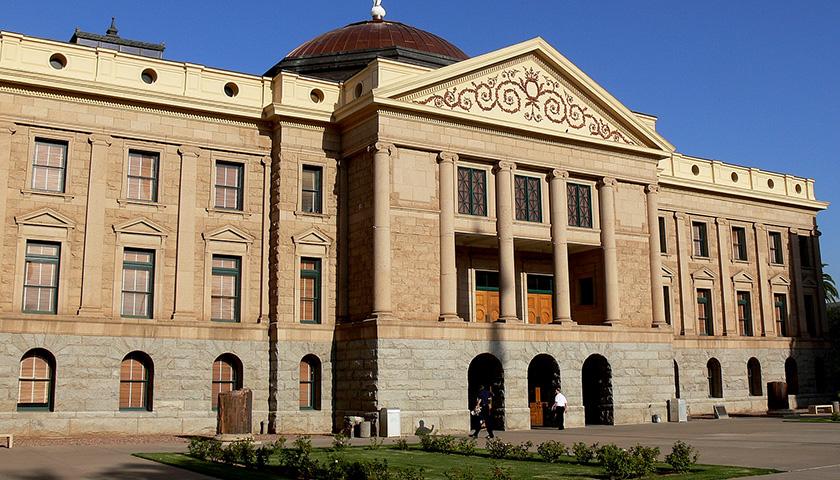Arizona Right to Life (AZRTL) appealed a trial court judge’s rejection of its lawsuit challenging the Right to Abortion Initiative, Prop. 139, which will appear on the ballot this fall.
AZRTL filed an opening brief with the Arizona Supreme Court on Monday, asking the court “to find the Ballot Measure legally insufficient for placement on the Arizona Ballot because the petition’s summary misrepresented and concealed the principal provisions of the Ballot Measure.” Prop. 139 will legalize abortion up until ninth months of pregnancy, including partial-birth abortion.
Jill Norgaard, a spokesperson for AZRTL who served previously in the Arizona Legislature, issued a statement about the language. “If abortion is a new fundamental right, then this will ultimately lead to tax-payer funded abortion for every Arizona citizen,” she said. “This is just the tip of the iceberg of the consequences stemming from the vague and sweeping language without clear definitions – read the language to understand how the public is being misled.”
The brief cited Molera v. Hobbs, where the Arizona Supreme Court held that “to be legally sufficient, a ballot initiative must not engage in a ‘bait and switch’ in which the summary attracts signers but misrepresents or omits key provisions. … The court should disqualify an initiative from the ballot whenever the 100-word description either communicates objectively false or misleading information or obscures the principal provisions’ basic thrust.”
Many petition signature gatherers were caught on video stating incorrect information about Prop. 139 to persuade voters to sign. Some of them said all abortion was currently illegal in Arizona, even to save the life of the mother (abortion is illegal after 15 weeks except for rare circumstances like that). Most of them said Prop. 139 would only legalize abortion for up to 15 weeks or slightly more. One said that women must go to Mexico to get abortions.
Drafted by attorneys Jennifer Wright and Tim LaSota, the brief said the summary of the petition that was provided when collecting signatures failed in two “critical” ways. “First, it omits statutory text regarding the critical questions of who makes the decision on (1) when an unborn child is viable outside the womb, and (2) whether an abortion is necessary to protect the mental or physical health of the mother, and obscures the fact that the abortion provider decides abortion necessity, based on that provider’s subjective ‘good faith judgment’ rather than an objectively verifiable medical standard, as is required for exceptions to certain existing abortion restrictions. … Second, it fails to mention that the Amendment completely negates both existing and potential future Arizona abortion regulations.”
Since summaries are allowed up to 200 words, but the summary was only 190 words, the brief pointed out that it could have included the key language, “good faith judgment” and “treating.”
The brief said an abortion provider “generally will have a financial incentive to find that an unborn child is not viable or if the child is, that an exception applies,” so the description should have alerted voters to this “broad and largely unrestricted ability.” As a result of omitting that language, “Untold number of signers were misled and signed believing the Amendment relied on objective evidence-based medical standards,” AZRTL argued.
Due to the broad, vague nature of the language “mental and physical health exception,” the Sixth Circuit Court of Appeals said in a 1997 opinion that it “render[s] meaningless the State’s compelling interest in protecting fetal life.” The brief went over Supreme Court opinions which upheld states’ compelling interest in this area.
“At a minimum, this means the State can do nothing to stop the abortion, even if it is being done for the worst eugenic or racist reasons, is being done in a horrific manner that is particularly painful to the prenatal human or is being done at any time up to birth,” AZRTL said. “Arguably, this provision would also bar genuine health-related measures such as facility licensing, sanitary disposal of biologic remains, requiring adequate malpractice insurance coverage, and so forth, if the abortion provider claims that such measures would force the facility to close and thus impair ‘autonomous decision-making.’”
Some of the petition signature collectors told voters that Prop. 139 would merely codify Arizona’s ban on abortions after 15 weeks into law. However, that law, A.R.S. 36-2322, leaves it to doctors to decide viability, not any abortion provider. “The determination of probable gestational age shall be made according to standard medical practices and techniques used in the medical community,” the statute provides. The brief said, “The standard, as legislated, must be assessed and implemented by a licensed physician.”
Compounding the problem, the brief said, is the language of Prop. 139 itself doesn’t clearly state that it will allow up to nine-month partial-birth abortions. “While many voters may be willing to sign a petition allowing abortion up to viability, the vague and poorly defined post-viability clause does not reveal the true intent of the Amendment that constitutionally protects late-term abortions. … As written, this Amendment is inherently misleading because it purports to claim that abortion will be barred after viability but in reality, constitutionally protects abortion up to birth.”
Next, the brief pointed out that “the Description fails to inform would-be signers of the drastic changes in law the Amendment’s passage would demand,” such as eliminating the 15-week ban and Arizona’s parental consent law. Dismantling these laws “is not an ancillary or speculative effect, but the primary and necessary result of the Amendment – its primary thrust.”
The brief concluded, “The Ballot Measure Proponents have a right to advocate for unregulatable right to abortion in the State of Arizona. However, that right does not include the ability to draft an Amendment and a misleading 200-word description of purported principal provisions because they do not want to tell would-be signers that the Amendment codifies an absolute right for anyone of any age to obtain an abortion on demand, up to natural birth. … The Amendment purports to create a qualified right to abortion when in reality, it provides unfettered access to abortion with illusory limitations.”
The Arizona Supreme Court gave pro-lifers a minor victory on Wednesday regarding the language drafted by the Arizona Legislature describing Prop. 139 that will be included in the publicity pamphlet. Upholding the position of Arizona State Senate Republicans, the court said the ballot description can include the phrase “unborn human being,” reversing a decision by Maricopa County Superior Court Judge Christopher Whitten, who was appointed to the bench by Democratic Governor Janet Napolitano.
– – –
Rachel Alexander is a reporter at The Arizona Sun Times and The Star News Network. Follow Rachel on X / Twitter. Email tips to [email protected].
Photo “Arizona for Abortion Access Supporters” by Arizona for Abortion Access.





